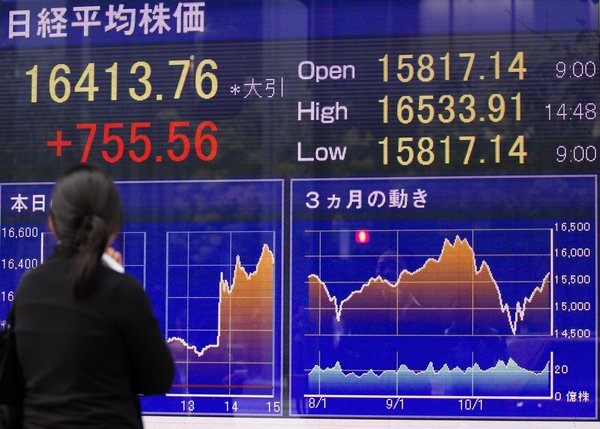(单词翻译:单击)
TOKYO — Japan is opting for another round of shock treatment, in a stark admission that the country's economic revival plan is faltering.
东京——日本选择采取又一轮令人震惊的举措,明确承认了日本的经济复兴计划步履蹒跚。
After insisting for more than a year that its aggressive monetary action was sufficient, the Bank of Japan on Friday unexpectedly announced that it would buy larger quantities of government debt. By injecting more money into the economy, the central bank is trying keep borrowing costs low, encourage spending and, ultimately, stoke inflation and growth.
日本银行(Bank of Japan)在过去一年多的时间里一直坚称其积极的金融举措已经足够,但该银行在周五出人意料地宣布,他们将购买大量政府债券。通过给经济注入更多资金,该中央银行试图将借贷成本保持在较低水平,鼓励消费,最终推动通货膨胀和增长。

The bold move helped push stocks higher around the world. The Standard & Poor's 500-stock index rose 1.1 percent Friday, and European equities ended the day up more than 2.5 percent.
这种大胆举措在一定程度上推动了全球股价上涨。周五,标准普尔500指数(Standard & Poor's 500)上升了1.1%,欧洲股市收盘上涨超过2.5%。
In Japan, the Nikkei 225-stock index average hit fresh highs, jumping almost 5 percent for the day. The yen fell to its weakest level against the dollar in a month.
在日本,日经225指数(Nikkei 225-stock index)达到历史新高,当天上升了将近5%。日本兑美元的汇率降至一个月来的最低水平。
The central bank's stimulus has been the cornerstone of a nearly two-year effort by Shinzo Abe, Japan's prime minister, to reinvigorate the economy and end the persistent consumer price declines that have weighed on growth since the 1990s. But that plan, collectively known as Abenomics, has shown signs of strain lately, as economic output contracted sharply in the second quarter.
日本央行的刺激举措是日本首相安倍晋三(Shinzo Abe)近两年来努力重振经济,终结消费者物价持续下跌的基础,自20世纪90年代以来,消费者物价的下跌一直在制约经济发展。但随着第二季度的经济产出大幅减少,这项统称为“安倍经济学”(Abenomics)的计划最近出现了紧张迹象。
With pressure mounting, the central bank said it wanted to act pre-emptively, rather than risk eroding the progress the country has made in changing the public's deflationary mindset. The Bank of Japan said it would target asset purchases of 80 trillion yen a year, or $734 billion, up from a previous range of 60 trillion yen to 70 trillion yen.
鉴于压力与日俱增,日本银行称自己想先发制人,他们不想冒险,让该国在改变民众通货紧缩思维方面所取得的进展功亏一篑。该银行称自己的目标是每年购买价值80万亿日元(约合4.4万亿元人民币)的资产,而之前的规模是60万亿至70万亿日元。
The decision underscores Japan's divergent path with the United States. Citing the strength in the U.S. economy, the Federal Reserve ended its six-year bond-buying campaign this week, an important milestone in the country's recovery.
这一决定突显了日本不同于美国的策略。本周,美联储以美国经济势头强劲为由,结束了历时六年的债券购买行动,这是该国复苏过程中一座重要的里程碑。
Abe's handpicked central bank governor, Haruhiko Kuroda, greatly expanded a bond-buying program at the central bank in April 2013. Kuroda has maintained that the new monetary settings would be enough to lift inflation to 2 percent by about mid-2015.
2013年4月,安倍亲自挑选的央行行长黑田东彦(Haruhiko Kuroda)大幅扩大日本央行的债券购买计划。黑田东彦称,新的货币政策足以在大约2015年中期之前,将通货膨胀水平提升至2%。
The strategy has provided a much-needed jolt to the economy, albeit one whose effects have been unevenly distributed. The markets are likely to get another lift next year, as the government's giant pension fund moves more aggressively into stocks. The Government Pension Investment Fund said Friday that it would aim to hold 50 percent of its assets in stocks, up from 24 percent now.
这一战略为经济提供了急需的提振,尽管其效果的分布并不均衡。明年,随着政府的巨额养老基金更大规模地进军股市,市场可能会再次提升。日本政府养老投资基金(Government Pension Investment Fund)于周五表示,它的目标是将其50%的资产以股票的形式持有,而目前的比例是24%。


